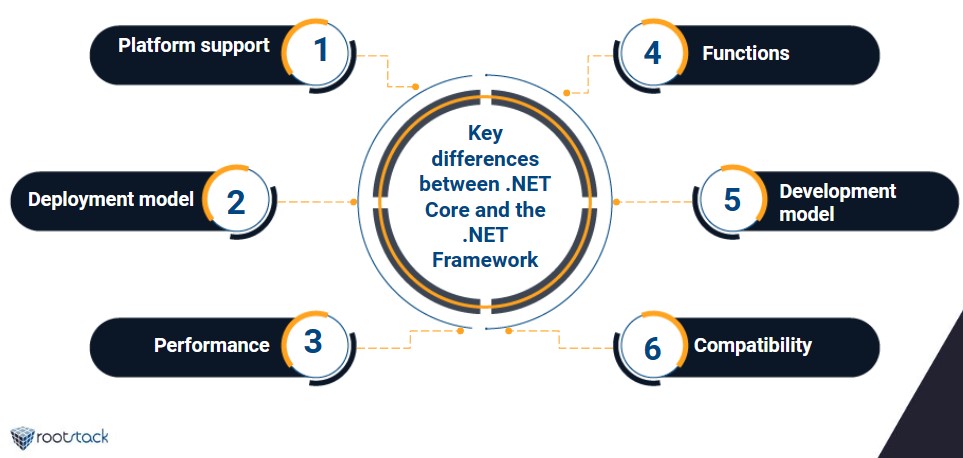
The skills a .NET development company must have to create a functional web application
October 06, 2023
Table of contents
Quick Access

When it comes to web application development, .NET is one of the ideal technologies for the process, something that any development agency knows. Therefore, they should dedicate themselves to improving their skills and knowledge in this framework created by Microsoft, known as .NET development.
.NET Framework is a software development platform developed by Microsoft, providing a comprehensive and consistent programming model for building Windows applications. This includes desktop applications, web applications, and services. The .NET Framework incorporates a large class library and supports several programming languages, including C#, Visual Basic, and F#. So, delving into .NET development can significantly enhance the capabilities of development agencies in crafting versatile and robust applications.
Key Features of .NET development
- Common Language Runtime (CLR): CLR is a key component of the .NET Framework. It provides various services such as memory management, security, and exception handling. It also allows interoperability between different .NET languages.
- Base Class Library (BCL): The BCL is a collection of pre-built classes and libraries that developers can use to perform common tasks such as file I/O, network communication, and data manipulation.
- Language Interoperability: The .NET development allows developers to use multiple programming languages to create applications. Code written in one .NET language can interact perfectly with code written in another .NET language.
- Windows Forms and WPF: The .NET development includes libraries for building Windows desktop applications, including Windows Forms for traditional Windows applications and Windows Presentation Foundation (WPF) for more modern, visually rich applications.
- ASP.NET: ASP.NET is a framework for creating web applications and services. It allows the development of dynamic web applications using technologies such as Web Forms, MVC (Model-View-Controller) and Web API.
- ADO.NET: ADO.NET provides data access capabilities, allowing developers to interact with databases using various data providers, such as SQL Server, Oracle, and MySQL.
- Windows Communication Foundation (WCF): WCF is a framework for creating distributed, service-oriented applications. It facilitates communication between different parts of an application or between different applications over a network.
- Windows Workflow Foundation (WF): WF is a framework for defining, running, and managing workflows within applications. It is used to create applications with complex business processes.

Skills needed to develop a web application with .NET
Building a functional web application using .NET or its modern counterparts (.NET Core, .NET 5, and later) requires a variety of skills and experience. If you are looking to hire a .NET development company to create a web application, these are the key skills and capabilities you should possess:
.NET development experience
Mastery of programming languages such as C#, VB.NET or F#. Also, strong knowledge of the .NET framework and its components and experience with ASP.NET for building web applications.
Web development frameworks
Knowledge of web development frameworks such as ASP.NET MVC, ASP.NET Core and Razor Pages.
Front-end development
Proficiency in HTML, CSS and JavaScript to create the user interface. Experience with front-end frameworks such as React, Angular or Vue.js, as many modern web applications use these technologies in combination with .NET.
Database integration
Experience in database design and management, with knowledge of SQL and database systems such as Microsoft SQL Server, MySQL or PostgreSQL. Experience with Entity Framework or other ORM (Object-Relational Mapping) tools for seamless database integration.

API development
Ability to create and consume RESTful or GraphQL APIs using ASP.NET Web API or ASP.NET Core Web API.
Authentication and authorization
Knowledge of identity and access management solutions, such as OAuth, OpenID Connect, and ASP.NET Identity, for user authentication and authorization.
Security
Understanding web application security best practices to protect against common vulnerabilities such as SQL injection, cross-site scripting (XSS), and cross-site request forgery (CSRF).
Performance optimization
Skills in optimizing web application performance, including load time, response times, and efficient use of server resources.

Testing and debugging
Proficient in unit testing, integration testing and debugging techniques to ensure application reliability and stability.
Implementation and DevOps
Experience with deployment tools and practices, including CI/CD (continuous integration/continuous deployment) pipelines. Knowledge of containerization technologies such as Docker and container orchestration platforms such as Kubernetes can be beneficial.
Version control
Familiarity with version control systems such as Git for code management and collaboration.
Scalability and performance optimization
Ability to design and implement scalable architectures to handle increased user loads. Proficiency in performance tuning and optimization of web applications.

Documentation and Communication
Strong documentation skills for code, API, and systems architecture. Effective communication and collaboration with clients and team members.
Troubleshooting
The ability to identify and resolve technical challenges and issues that may arise during development and after implementation.
Client-side and server-side validation
Implementation of robust validation mechanisms on both the client and server sides to ensure data integrity and security.
User experience (UX) design
Basic UX design skills to create intuitive and easy-to-use interfaces.
Knowledge of Cloud Platforms
Familiarity with cloud platforms such as Microsoft Azure or AWS if your application will be hosted in the cloud.
When evaluating a .NET development company, consider their portfolio, client reviews, and past projects to ensure they have the relevant experience and skills needed to create a functional web application that meets your specific needs and requirements. Additionally, open communication and collaboration between your team and the development company are essential for a successful project.
We recommend you on video
Related Blogs
-9.20.37-a.m.png)
Product Design and Development

Tools for Machine Learning

The Best Data Science Tools in 2025

What is Data Science?

How to use data science to improve a company's results?

